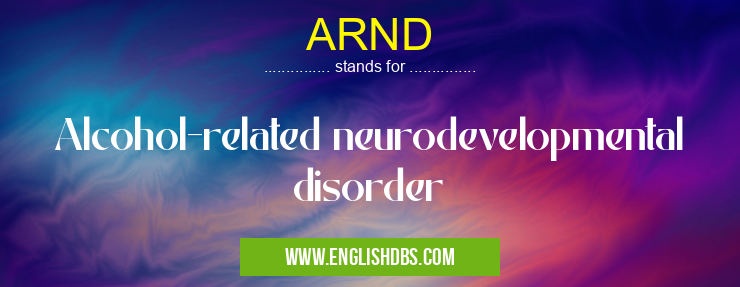What does ARND mean in DISEASES
Alcohol-related neurodevelopmental disorder (ARND) is an umbrella term that encompasses a wide range of problems caused by prenatal alcohol exposure in the child. These can range from mild to severe neurological deficits, delays in physical and mental development, speech and language delays, behavioral problems, social skills deficits, learning disabilities, and intellectual disabilities. ARND is also known as Fetal Alcohol Spectrum Disorders (FASD).

ARND meaning in Diseases in Medical
ARND mostly used in an acronym Diseases in Category Medical that means Alcohol-related neurodevelopmental disorder
Shorthand: ARND,
Full Form: Alcohol-related neurodevelopmental disorder
For more information of "Alcohol-related neurodevelopmental disorder", see the section below.
Definition
Alcohol-related neurodevelopmental disorder (ARND) is a set of conditions associated with prenatal alcohol exposure in utero. It includes a wide range of cognitive and behavioral deficits due to alcohol's effects on the developing brain. ARND can include physical impairments such as poor motor skills coordination and hearing loss; mental impairments such as delayed intellectual development; emotional impairments such as difficulty with social interaction; and behavioral impairments such as impulsivity or hyperactivity.
Causes
ARND is caused by prenatal exposure to alcohol during pregnancy. When a pregnant woman drinks alcohol or uses drugs, the substances travel through her bloodstream to her fetus. This can disrupt the normal development of the baby’s brain and other body systems. The more a woman drinks during pregnancy, the greater the risk for ARND.
Symptoms
The symptoms of ARND vary depending on the severity of prenatal exposure and can range from mild to severe deficits throughout different life stages. Some common symptoms include poor coordination or balance; low muscle tone; developmental delays in language, speech, cognition, gross motor development; impaired memory skills; behavioral problems such as irritability or impulsiveness; sensory difficulties such as decreased hearing acuity or vision impairment; and sleep disturbances.
Diagnosis
ARND is diagnosed through clinical evaluation which includes medical history review, neurological assessment, developmental testing and observation of behavior both at home and school setting if applicable. The physician may also conduct diagnostic tests including imaging studies like CT scans or ultrasounds after birth to help understand any potential abnormalities related to prenatal alcohol exposure. A diagnosis of ARND requires confirmed maternal use of alcohol during pregnancy with documented evidence of neurobehavioral deficits consistent with those caused by prenatal alcohol exposure.
Treatment
Treatment for ARND should be tailored to meet each individual child’s needs based on their symptoms and level of functioning. Treatments may include medications for co-occurring mental health conditions such as ADHD or depression alongside counseling services like family therapy or play therapy, educational interventions focused on skill building in areas where there are deficits seen due to Fetal Alcohol Spectrum Disorders (FASD), occupational therapy for physical impairments/coordination difficulties due to FASD etc.
Essential Questions and Answers on Alcohol-related neurodevelopmental disorder in "MEDICAL»DISEASES"
What is ARND?
Alcohol-related neurodevelopmental disorder (ARND) refers to the permanent effects of prenatal alcohol exposure on the fetus. It includes physical, mental, behavioral and learning disabilities resulting from prenatal alcohol exposure.
What type of disabilities can result from ARND?
Common disabilities that may be associated with ARND include intellectual disability, impaired motor coordination, language disorders, poor impulse control, problems with performing tasks and attention difficulties.
Who is at risk of having a child with ARND?
Any pregnant woman who consumes alcohol during pregnancy is at risk of having a child with ARND.
Are there any treatments available for a person with ARND?
Yes. Early intervention services such as occupational therapy, physical therapy and speech/language therapy can help children affected by ARND reach their fullest potential. Additionally, medications may be used to help manage certain symptoms associated with the condition.
Does abstinence from alcohol reduce the risk of ARND during pregnancy?
Abstaining from alcohol completely during pregnancy is the only way to reduce the risk of adverse outcomes or birth defects related to fetal alcohol exposure including those associated with ARND.
Can men contribute to an increased risk for a baby born with ARND?
Yes, research suggests that heavy drinking by father prior to conception may lead to an increased maternal stress level which can have negative impacts on fetal development potentially leading to ARND in her offspring.
Can breastfeeding reduce any risks associated with prenatal exposure in infants born with mental disabilities due to ARND?
Breastfeeding has been found beneficial for healthy growth and development but it does not reverse or compensate for damage caused by prenatal alcohol exposure or other developmental disabilities such as those associated with ARND.
Are children born through in-vitro fertilization (IVF) still at risk for developing birth defects related to fetal alcohol exposure including those associated with ARND?
Yes, there is no evidence that IVF reduces the likelihood of a child being exposed to harmful substances such as alcohol while in utero and therefore they are still at risk for developing birth defects related to fetal alcohol exposure including those associated with ARND.
Is FASD (Fetal Alcohol Spectrum Disorders) different than ARND?
Yes. FASD refers to a group of disabling conditions resulting from prenatal alcohol exposure which includes Fetal Alcohol Syndrome (FAS), Partial Fetal Alcohol Syndrome (pFAS) and Alcohol-Related Neurodevelopmental Disorder (ARND). However, it should be noted that FASD does not include all conditions related to prenatal alcohol exposure.
Final Words:
Alcohol-related Neurodevelopmental Disorder (ARND) has long lasting implications on children who have been prenatally exposed to alcoholic substances before birth due to their mother's consumption during pregnancy causing varying levels of cognitive deficits among other issues throughout their life stages into adulthood if left undiagnosed and untreated accordingly leading down various paths that require specialized intervention when needed in order for proper care provisioning for these affected children across multiple domains essential for healthy functioning from personal narratives till society at large leading towards successful outcomes wherever they maybe destined.
